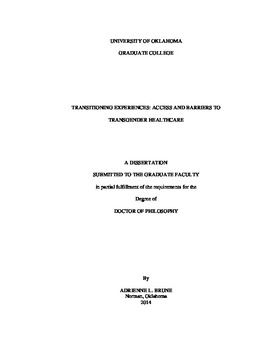| dc.description.abstract | Marginalized populations, including racial and ethnic minorities, women, and gays and lesbians, have often been discriminated against in healthcare, and this has been an important focus of health and medical research within sociology. But little attention has been paid by sociologists to the healthcare experiences of transgender individuals undergoing the transitioning process, which includes the specific medical and psychological steps taken to transition from either male to female or female to male. In-depth interviews with twenty transgender identified individuals were conducted to investigate access and barriers to transitioning healthcare services. A grounded theory approach was used for analysis. Four major themes related to accessing (or not accessing) transitioning healthcare services emerged from the analysis: social capital, ignorance and discrimination, instrumental factors, and agency. The findings suggest that constrained choice theory and social capital frameworks may be useful for understanding experiences with transitioning healthcare services. | en_US |
